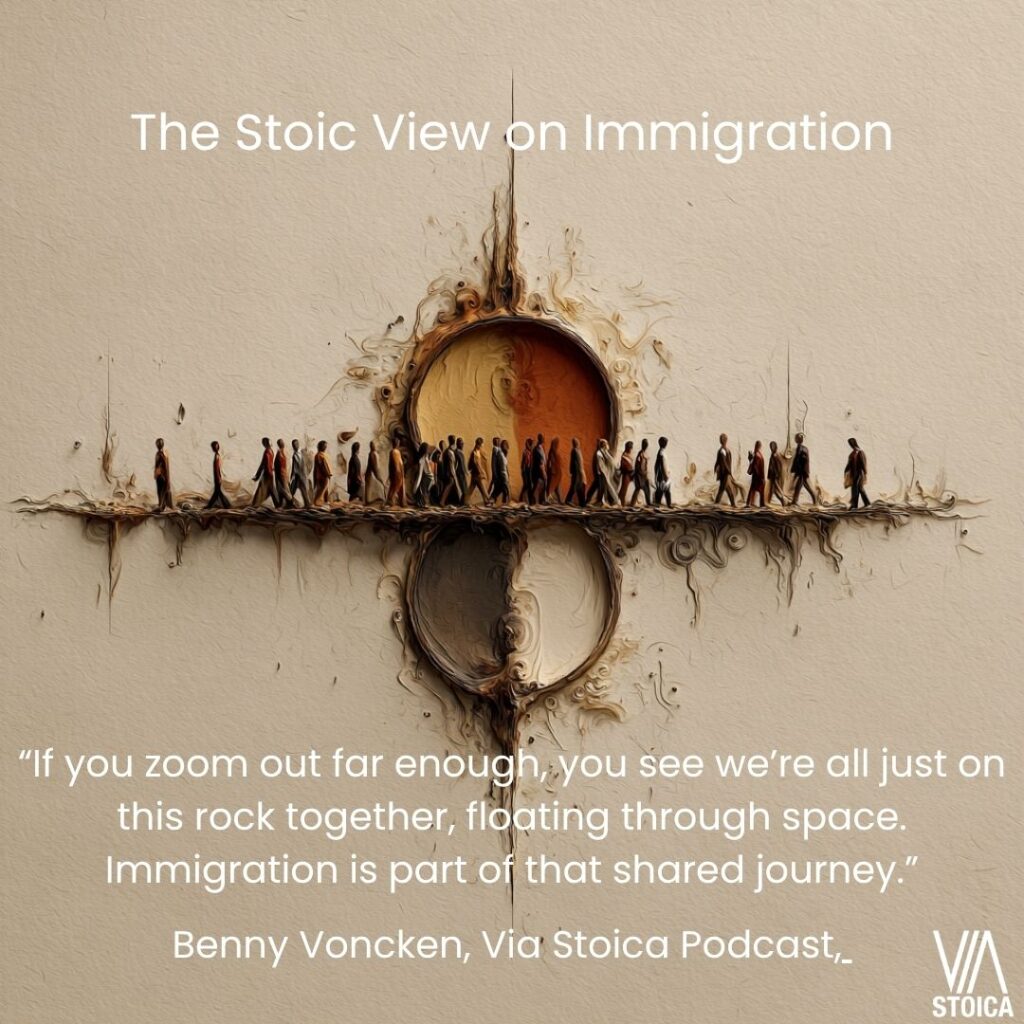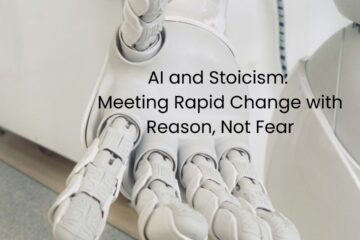
Immigration is often seen as a source of division, but through a Stoic lens, it becomes an opportunity for unity. Stoicism reminds us that we are not merely citizens of nations, but citizens of the world. This perspective helps us approach migration not with fear, but with reason, justice, and compassion.
“My city and state are Rome as Antoninus. But as a human being? The world.”
Marcus Aurelius, Meditations, Book 6.44
Understanding Migration and Immigration
Migration is the natural movement of people, just as animals migrate with the seasons. Immigration simply means entering a new country; emigration means leaving one. Most immigration today is legal and tied to work, study, or family reunification, while a much smaller percentage is illegal. For example, in the EU, only about 6–7% are non-EU citizens.
Yet news headlines often magnify extreme cases, fueling fear. Stoicism reminds us to focus on what is real, not on distorted impressions. Most immigrants, like all human beings, want peace, safety, and a better life for themselves and their families.
“Wrongdoing is not the property of a nationality or a religion; it’s simply a failure to use reason and logic.”
Benny Voncken, Via Stoica Podcast, The Stoic View on Immigration (29:30)
The Stoic Lens: Cosmopolitanism
The Stoics, following Diogenes the Cynic, embraced the idea of cosmopolitanism, being citizens of the world. Hierocles described expanding circles of concern: starting with the self, then family, community, nation, and finally the cosmos. The task of the Stoic is to draw these circles closer, recognizing strangers as kin.
If we reduce people to labels, skin color, religion, or language, we fall into the trap of false judgments. Instead, Stoicism teaches us to see others as rational beings who share the same needs: food, safety, shelter, and dignity.
“If we label people before we know them, we create division where there could have been enrichment.”
Benny Voncken, Via Stoica Podcast, The Stoic View on Immigration (16:50)
Virtue Ethics and Role Ethics
From the Stoic perspective, what matters most is character. Wrongdoing is not the property of a nationality or religion, but a failure of reason. Our task is twofold:
- Virtue Ethics: Strive to be good ourselves, showing kindness, justice, and compassion.
- Role Ethics: Consider our role in each situation, whether as a host, a traveler, or a fellow citizen of the world, and act accordingly.
Marcus Aurelius reminds us:
“What injures the hive injures the bee.”
Marcus Aurelius, Meditations, 6.54
Our well-being is tied to the well-being of others.
Immigration, Fear, and Stoic Practice
Common fears about immigration, economic competition, cultural loss, or crime are often exaggerated or misrepresented. Stoicism encourages us to distinguish between impressions and reality. Fear is a destructive passion, but reason allows us to see clearly: many immigrants enrich societies through essential work, cultural traditions, and fresh perspectives.
Instead of resisting, we can practice:
- Education: Learn about other cultures and share our own.
- Compassion: Recognize the hardships that drive people to move.
- Justice: Support fair treatment and equal dignity for all.
A Global Stoic Perspective
From the Stoic “view from above,” we see humanity as one family, floating together on a small planet in an infinite cosmos. National borders fade, and what remains is our shared duty: to treat each other with justice, wisdom, and humanity.
“If you zoom out far enough, you see we’re all just on this rock together, floating through space. Immigration is part of that shared journey.”
Benny Voncken, Via Stoica Podcast, The Stoic View on Immigration (30:00)
To explore this reflection further, you can watch the full podcast episode here: The Stoic View on Immigration – Via Stoica Podcast.
Want to explore more Stoic practices?
Book a free consultation with one of our Stoic Coaches. You can also listen to the Via Stoica podcast on Spotify or Apple Podcasts or watch it on YouTube.
Author Bio
Benny Voncken is the co-founder of Via Stoica, where he helps people apply Stoic philosophy to modern life. He is a Stoic coach, writer, and podcast host of The Via Stoica Podcast. With almost a decade of teaching experience and daily Stoic practice, Benny creates resources, workshops, and reflections that make ancient wisdom practical today.


0 Comments